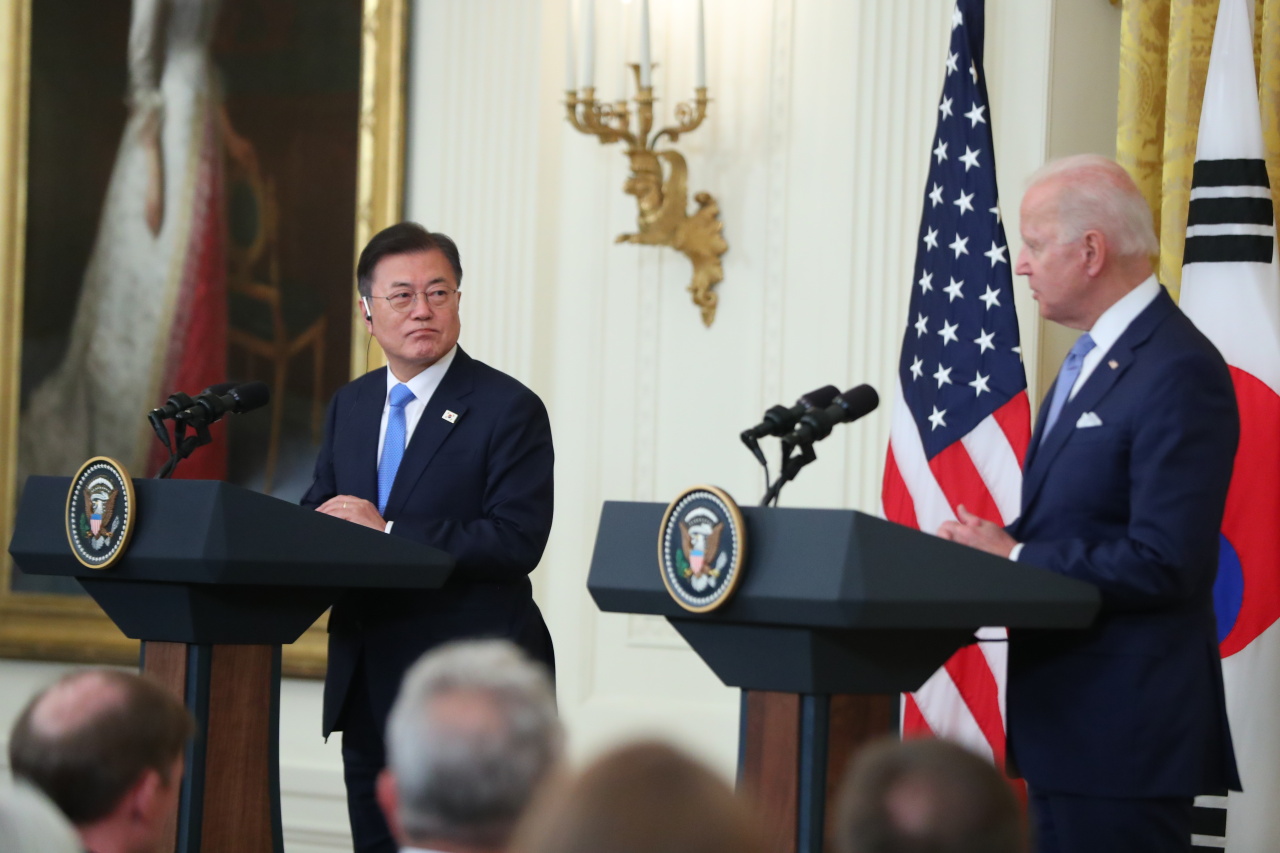 |
South Korean President Moon Jae-in (left) and US President Joe Biden hold a joint press conference at the White House in Washington on Friday. (Yonhap) |
This week's summit agreement between South Korea and the United States on COVID-19 vaccines, tech supply chains, climate change and other non-security issues underscored a broadening of their alliance amid heightened Sino-US rivalry, analysts said Saturday.
During their first in-person summit in Washington on Friday, Presidents Moon Jae-in and Joe Biden agreed on broad-based cooperation, as the US seeks to rally its democratic allies to confront shared challenges such as an assertive China and a recalcitrant North Korea.
The summit came as Seoul explored ways to stably manage both its security alliance with Washington and strategic partnership with Beijing while steering clear of rising geopolitical tensions between the major powers.
"The agreement signals that the alliance is taking shape as a comprehensive partnership given greater technology and economic cooperation affects all aspects of people in both countries," said Nam Chang-hee, professor of international politics at Inha University.
"This could mark a turning point where width and depth will be added to the alliance -- against the backdrop of the sharpening Sino-US competition that has added pressure on South Korea to make a choice," he added.
The summit agreement included forging a partnership on global vaccine supplies, the US' provision of full vaccinations for 550,000 South Korean troops and cooperation in building stable supply chains for semiconductors and electric car batteries.
Friday's White House summit -- Biden's second with a foreign leader after his talks with Japanese Premier Yoshihide Suga last month -- and pre-summit events appeared carefully choreographed to highlight the evolving nature of the alliance that had hitherto focused on countering North Korean threats.
Hours before the summit, four major Korean companies, including Samsung Electronics and LG Energy Solution, announced plans to invest US$39.4 billion in the US in a move that signaled Korea's support for America's drive to reshape global supply chains.
The investment plans involved semiconductors and electric vehicle batteries -- two core areas that the US sees as intrinsic to rebuilding supply chains against China's dominance and addressing manufacturing vulnerabilities laid bare during the COVID-19 pandemic.
Attended by the presidents, the symbolic ceremony awarding a medal of honor to a Korean War veteran served as a sharp reminder that the two countries forged their alliance in their joint fight for democracy against communism during the 1950-53 conflict.
Biden cast the medal ceremony as an "affirmation of our shared history of sacrifice."
"It's a commitment to expanding cooperation and shaping our shared future," he said, stressing "our democratic values that have made our nation strong and agile and highly competitive in the 21st century economies."
Moon hailed the evolution of the two countries' partnership into a "comprehensive alliance" encompassing social, political and economic realms, which is designed to "protect shared values of freedom, democracy and human rights."
His remarks came as Seoul has been facing growing pressure to show "strategic clarity" rather than ambivalence in the midst of the great-power rivalry on multiple fronts, including technology, trade and security.
Both presidents' paean for the alliance was born out of mutual necessity, but it apparently reflected Seoul's tough deliberations on the future of the alliance.
Foreign Minister Chung Eui-yong has maintained that the US and China are "not a subject of choice," and that it would seek to enhance relations with both major powers "harmoniously" despite the US being the "foundation of South Korea's foreign and security policy."
But the increasingly acrimonious competition between the US and China has triggered an intense debate over whether South Korea should take more concrete steps in favor of America's regional preeminence.
"From a long-term perspective, the Biden administration has focused on rebuilding America's internal capacities to respond to China's rise while avoiding direct confrontation, and to that end, what is required is the group of allies that can contribute to the US economy and a reshaping of supply chains for core, strategic industries to keep China in check," Kim Heung-kyu, the head of the US-China Policy Institute at Ajou University, said.
"Thus the demand has arisen for South Korea to contribute to the US policy priorities as a signal that South Korea wouldn't give short shrift to the alliance. Of course, in return, the US is offering vaccine cooperation and support vis-a-vis North Korea," he added.
The alliance collaboration could unnerve China, which has sought to cultivate closer relations with South Korea in what some analysts say might be a move to forestall Seoul's tilt away from its geopolitical orbit.
The summit between Moon and Biden came as Seoul and Beijing seek to draw up a blueprint for the future development of bilateral relations before the 30th anniversary next year of the establishment of bilateral relations.
"China could cast doubts over whether South Korea is participating in what it believes is America's diplomacy anchored in values and ideology," Professor Kim said.
"China may want to avoid the situation in which the South Korea-US alliance will take a military role of some sort related to China under the name of deterrence against North Korea. It might hope that Seoul would maintain the policy balance it had maintained between the two powers," he added. (Yonhap)


![[Weekender] Geeks have never been so chic in Korea](http://res.heraldm.com/phpwas/restmb_idxmake.php?idx=644&simg=/content/image/2024/05/16/20240516050845_0.jpg)


![[News Focus] Mystery deepens after hundreds of cat deaths in S. Korea](http://res.heraldm.com/phpwas/restmb_idxmake.php?idx=644&simg=/content/image/2024/05/17/20240517050800_0.jpg)
![[Herald Interview] Byun Yo-han's 'unlikable' character is result of calculated acting](http://res.heraldm.com/phpwas/restmb_idxmake.php?idx=644&simg=/content/image/2024/05/16/20240516050855_0.jpg)

